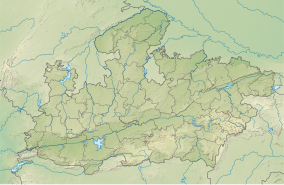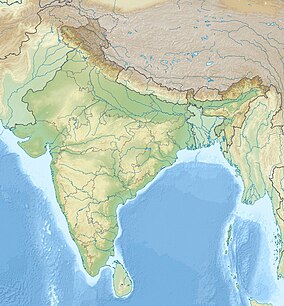Veerangana Durgavati Wildlife Sanctuary
Wildlife sanctuary in Madhya Pradesh, India From Wikipedia, the free encyclopedia
Veerangana Durgawati Wildlife Sanctuary is a wildlife sanctuary in Damoh district and Sagar district of Madhya Pradesh, India. It was declared as a wildlife sanctuary in 1996.[1] In 2023, it was declared as a tiger reserve with a total area of 2,339.12 square kilometres (903.14 sq mi).[2]
| Veerangana Durgavati Wildlife Sanctuary | |
|---|---|
IUCN category IV (habitat/species management area) | |
| Location | Damoh district and Sagar district, Madhya Pradesh, India |
| Nearest city | Damoh |
| Coordinates | 22°32′49″N 79°43′43″E |
| Area | 2,339.12 km2 (903.14 sq mi) |
| Established |
|
| Governing body | Ministry of Environment, Forest and Climate Change, Madhya Pradesh Forest Department |
Geography
It is located in Damoh district of Madhya Pradesh. It was declared as a wildlife sanctuary in 1996 and a tiger reserve in 2023. It cover total area of 2,339.12 square kilometres (903.14 sq mi) with 1,414 square kilometres (546 sq mi) of core and 925.120 square kilometres (357.191 sq mi) of buffer area. It is named after Rani Durgavati. The sanctuary has a varied landscape consisting of hills, valleys and plains with several streams flowing through them.[2]
Flora
The vegetation is predominantly tropical mixed dry deciduous forest and some teak forests with trees accounting for 70 of the 121 species of plants found here.[3] Pterocarpus marsupium, Terminalia alata, Anogeissus latifolia, Madhuca indica, Butea monosperma and Lagerstroemia parviflora are the most common trees in the sanctuary.[citation needed] The Singorgarh fort are located within the sanctuary.[4]
Fauna
The sanctuary hosts 18 species of mammals, including the leopard, wolf, jackal, Indian fox, the striped hyena and sloth bear besides several species of deer. Besides these, the sanctuary is also home to 177 species of birds, 16 species of fish and reptiles and 10 species of amphibians.[3]
References
Wikiwand - on
Seamless Wikipedia browsing. On steroids.

